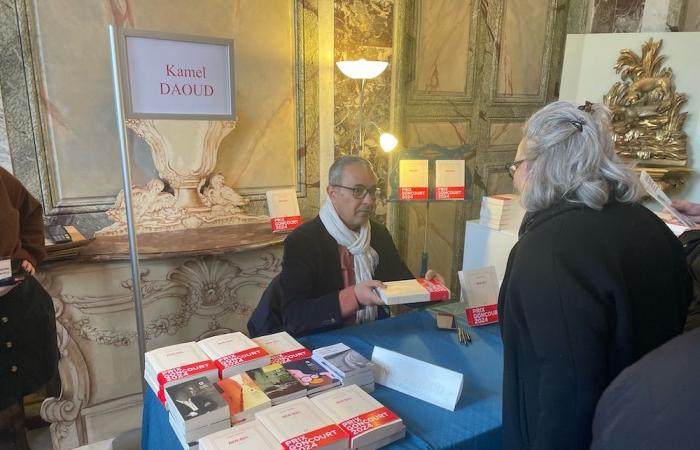The press mainstream in France, from Monde has Current Valuespassing through Liberation et The Pointdenounces in advance any literary or ideological questioning of the sayings and writings of the one who has just received the Goncourt for his Houris (Gallimard, 2024). But this indictment coming from Algeria, if it were proven, would be likely to break on an ethical level this media unanimity around “the most feminist novel of the new school year» (Frédéric Beigbeder) by which “ a young survivor […] of the Algerian civil war [mettrait] finally words about its history » (Elle04/11/24).
OnOne TV Saâda Arbane believes in fact that this author who claims to give a voice to the women of his country against the Islamists would in reality “ dispossessed a victim of terrorism of his history, of his life, against his will”, and despite “ the categorical refusals of his parents during their lifetime ».
She assures that the Algerian author would have “ exploited his personal history without his consent”, or even by misusing confidences collected in a medical setting. Having “took more than twenty-five years to forget» son « trauma “, she believes that Kamel Daoud would have “stirred up the wounds »of a story which she considered “the only one to decide how [elle devait] to go out».
« My family and those around me, who knew that I did not want to talk about this story, were shocked“, she testifies, adding that this story, “ It's something that bothers me in my life. Everyone told me: “ It's weird what you did ” “. After the publication of Houris« I even got called to ask me how much I was paid for the book“. A “friend living in Paris » had difficulty believing that “ I let my story be used that way. ».
Medical confidentiality swept away?
She herself was marked: “ When I started reading the book, I didn't sleep for three days “. And to add: “ I've been hiding my story for 25 years, hiding my face, refusing to be pointed at. It's horrible… »
BEST SELLERS – Le Goncourt by Daoud, opposite the Memoirs of Bardella
She adds this more serious accusation against the writer concerning “details of his personal life » which she only ever confided in therapy: “He took everything from his wife […].We can't talk like that until we've experienced it. […]. This is my life, this is my past. Only I can judge how it should come out. It's not his place to do that. It wasn't his place to throw me away like that. Besides, he sullies my reputation ».Houris« is a violation of my privacy ».
Beyond the incontestable and legitimate right of the writer to fiction and free creation, these declarations raise serious questions of both literary and medical ethics.
In the show “Houristhe counter-investigation”, the young woman affirms that Fajr's life would surprisingly resemble hers: “My scar. My cannula. Conflicts with my mother. The operation I had to undergo in France, the pension I receive as a victim [du terrorisme islamiste]. Abortion, I wanted to have an abortion. The meaning of my tattoos [au niveau de la nuque et du pied]. The hair salon, I had a hair and beauty salon and it's in the book. Lotfi high school. The romantic allusion to my passion for horse riding», she lists to the journalist.
What is the origin of this information?
How could such precise facts have reached the novelist? According to her, it would be a “violation of medical confidentiality» by his former psychiatrist, Ms. Daoud. She claims that she would have been followed by the latter, from 2015 until the departure of the Daoud family to France, in several medical establishments in Oran, first for group therapy with her mother, and then alone.
The survivor of the Djelfa massacre insists on the fact that during her consultations with Ms. Daoud, her words were completely free: “I didn't have a filter [je parlais] without taboos, I said everything. For me, she was my psychiatrist. There was medical confidentiality, I said everything.» During her interview, she specifies that “three and a half years ago, the writer [lui] asked for permission to tell [s]we story in a book. My refusal was categorical. I was at his house, cited Hesnaoui. His wife had invited me over for coffee and to discuss my therapy. »
Afterwards, she continues, when “his wife told me that he is writing a book, I told her: “Be careful, I don't want it to be on me”. She told me: “No, it's not about you at all”. Several times during my consultations, I repeated to his wife: “Be careful, I refuse to let him do that” ».Ms. Daoud would have reassured her by replying: ““Not at all… I'm here to protect you.” »
A novel all too real
Today, and after readingHourisshe judges that she would not have been protected in any way by her doctor. “I told his wife all these details as a psychiatrist […] I never told anyone[d’autre]“, she says. His intimate conviction is that Kamel Daoud would have had access “has [s]we story» through his wife and psychiatrist.
According to her,Houriswould be a “disclosure of medical confidentiality» : « I never communicated my medical records to Kamel Daoud.[…]I never allowed Kamel Daoud or his wife, my psychiatrist, to tell my story.» The young woman further believes that the writer would have “waited for the death of [s]you have both parents to do this ».
The interest of the press, media and writers in the story of Saâda Arbane is not new. In 2009, she says, “when I won the gold medal at the Maghreb Equestrian Championship […],I started to receive the first requests to tell my story“. Since then, for her as for her parents bykafala(Muslim form of “adoption), the refusal to tell his story was categorical.
“My privacy has been revealed”
«For 25 years, she continues, I have refused to have my story told for me. It's my privacy, it's my story.[…]I refused to have my story shared“, more “he disclosed it well,[…] my privacy was revealed“. And if she decided to speak today, it would be “to denounce the abuse that Kamel Daoud made in his book of my history ».
According to her, Ms. Daoud went to her home last October to give her a copy ofHourisbearing a dedication signed by the writer: “Our country has often been saved by courageous women, and you are one of them, with my admiration.»
The latter would have “talked about the film project and his possible involvement in the screenplay» which could make him «earn a lot of money» by which she could “buy your apartment in Spain“. Saâda Arbane says she understood this proposition “as an attempt to buy him and get him to shut up».
Also in front of the journalist fromOne TVher husband considers that the publication ofHourisand its hypermedia coverage “rubbed the knife in the wound” of his wife's family history and that, since then, “she finds it extremely difficult to feed herself and sleep », «suffers from severe headaches“. According to him, the novel “brought back bad memories» and this could have a negative impact on their eight-year-old son.
The writer has not yet reacted to these statements.
Photo credits: Kamel Daoud – ActuaLitté CC BY SA 2.0
By Guest Author
Contact : [email protected]






